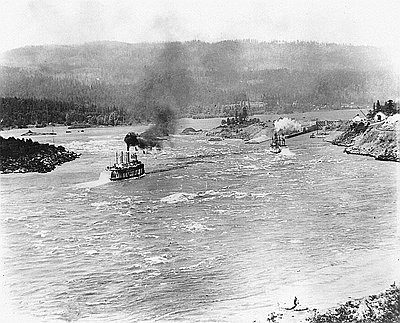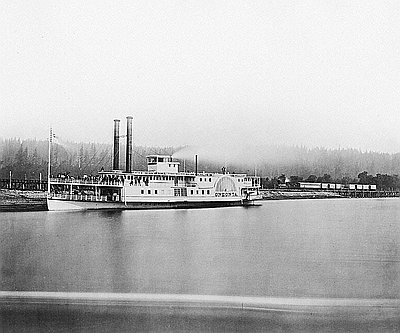- Catalog No. —
- Mss 1506
- Date —
- March 21, 1862
- Era —
- 1846-1880 (Treaties, Civil War, and Immigration)
- Themes —
- Trade, Business, Industry, and the Economy, Transportation and Communication
- Credits —
- Oregon Historical Society
- Regions —
- Portland Metropolitan Willamette Basin
- Author —
- Unknown
Freight List for the Steamer Express
The steamer Express operated on the Willamette River from the mid-1850s to the early 1860s at a time when several companies competed for river business. Steamboat travel on the Willamette began in the 1850s with routes both above and below Willamette Falls at Oregon City. Until the Willamette Falls locks were opened in 1873, passengers and cargo were portaged around the forty-foot-high falls on wagon roads and wooden rails and by railroad. The locks enabled steamboats to travel between Portland and Eugene. Wheat, bran, and other farm products were transported from Willamette Valley towns to Portland for shipping to California, the Columbia Plateau, the East Coast, and even Europe. Sawmills and gristmills at Oregon City also sent processed products on steamboats to Portland for export to distant markets. In 1862, sixty-five stockholders organized the People’s Transportation Company, which held a monopoly on the river’s traffic until railroad lines were developed in the 1870s.
The Express was the second sternwheeler steamboat built in the Pacific Northwest. It was launched in Oregon City in 1854. Captain Alexander S. Murray and associates operated the steamboat for several years before selling it to the Oregon Steam and Navigation Company.
Further Reading:
Schwantes, Carlos A. Long Day’s Journey: The Steamboat & Stagecoach Era in the Northwest. Seattle, Wash., 1999.
MacDuffee, K. M. “Navigating the Upper Willamette River 1846-1936.” Portland, Oreg., 1940.
Reddick, Suann Murray. “From Dream to Demolition: The Yamhill Lock and Dam.” Oregon Historical Quarterly 91, 1990: 43-80.
Written by Kathy Tucker, Oregon Historical Society, 2002.
Related Historical Records
-
Steamboats on the Columbia River at Cascade Locks
This 1908 photograph shows the steamboats Bailey Gatzert (left) and the Charles R. Spencer entering the Cascade Canal and Locks. Both of the steamers were known as fast …

-
Steamboat Oneonta, Columbia River
The Oneonta, a side-wheeler steamboat built in 1863 by Samuel Forman, gave the Oregon Steam Navigation Company a transportation link on the “middle” part of the Columbia River. …

